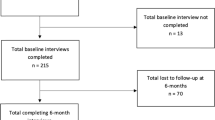Abstract
Objective
To assess the correlation between expectations of recovery and whiplash patients’ perceptions of injury severity using a simplified instrument. Expectations of recovery have been shown to predict rate of recovery from whiplash injury in population-based studies. The perception of having more severe pathology or more ominous diagnostic labels has also been associated with a worse prognosis.
Methods
Consecutive patients with whiplash-associated disorder grade 1 or 2, presenting in the acute stage to a primary care centre, were asked “do you think that your injury will…” with response options “get better soon; get better slowly; never get better; don’t know.” Injury severity perception (ISP) was measured with a numerical rating scale which ranged from 0–10, on which subjects were asked to rate how severe (in terms of damage) they thought their injury was. The anchors were labeled “no damage” (0) and “severe, and maybe permanent damage” (10). The primary outcome measure was the correlation between the subject’s ISP score and expectation of recovery.
Results
A total of 94 subjects (34 males, 60 females, and mean age (40.6±10.0) years, range 19–60 years) were included. The initial responses to expectation of recovery were: get better soon (29/94); get better slowly (22/94); never get better (11/94); don’t know (32/94). The mean ISP score was 4.9±1.7 (range 2–9 out of 10). There was a high correlation between expectations and ISP scores (Spearman’s rank correlation coefficient 0.68). Those who expected to recover soon and those who expected to get better slowly had the lowest ISP scores.
Conclusions
The more slowly whiplash patients expect to recover, or the less sure they are of recovery, the more severe their initial perceptions of injury.
Similar content being viewed by others
References
Bostick, G.P., Ferrari, R., Carroll, L.J., Russell, A.S., Buchbinder, R., Krawciw, D., Gross, D.P., 2009. A population-based survey of beliefs about neck pain from whiplash injury, work-related neck pain, and work-related upper extremity pain. Eur. J. Pain, 13(3):300–304. [doi:10.1016/j.ejpain.2008.04.003]
Buitenhuis, J., de Jong, P.J., Jaspers, J.P.C., Groothoff, J.W., 2008. Catastrophizing and causal beliefs in whiplash. Spine, 33(22):2427–2433. [doi:10.1097/BRS.0b013e318183c6ca]
Carroll, L.J., Holm, L.W., Hogg-Johnson, S., Côtè, P., Cassidy, J.D., Haldeman, S., Nordin, M., Hurwitz, E.L., Carragee, E.J., van der Velde, G., et al., 2009a. Course and prognostic factors for neck pain in whiplash-associated disorders (WAD): results of the bone and joint decade 2000–2010 task force on neck pain and its associated disorders. J. Manip. Physiol. Ther., 32(2):S97–S107. [doi:10.1016/j.jmpt.2008.11.014]
Carroll, L.J., Holm, L.W., Ferrari, R., Ozegovic, D., Cassidy, J.D., 2009b. Recovery in whiplash-associated disorders: Do you get what you expect? J. Rheumatol., 36(5):1063–1070. [doi:10.3899/jrheum.080680]
Ferrari, R., 2002. The chronic whiplash syndrome: a case of attributional pathosis? Cephalalgia, 22(7):560–562. [doi:10.1046/j.1468-2982.2002.00302.x]
Ferrari, R., Russell, A.S., 2008. Whiplash: social interventions and solutions. J. Rheumatol., 35(12):2300–2302. [doi:10.3899/jrheum.080280]
Holm, L.W., Carroll, L.J., Cassidy, J.D., Skillgate, E., Ahlbom, A., 2008. Expectations for recovery important in the prognosis of whiplash injuries. PLos. Med., 5(5):760–767.
Ozegovic, D., Carroll, L.J., Cassidy, J.D., 2009. Does expecting mean achieving? The association between expecting to return to work and recovery in whiplash associated disorders: a population-based prospective cohort study. Eur. Spine J., 18(6):893–899. [doi:10.1007/s00586-009-0954-4]
Author information
Authors and Affiliations
Corresponding author
Rights and permissions
About this article
Cite this article
Ferrari, R., Louw, D. Correlation between expectations of recovery and injury severity perception in whiplash-associated disorders. J. Zhejiang Univ. Sci. B 12, 683–686 (2011). https://doi.org/10.1631/jzus.B1100097
Received:
Accepted:
Published:
Issue Date:
DOI: https://doi.org/10.1631/jzus.B1100097




